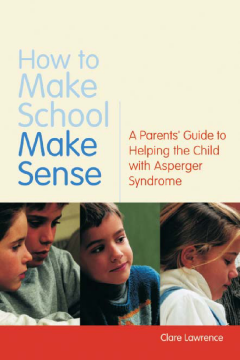
Additional Information
Book Details
Abstract
Every child's education relies on a partnership between parents, professionals and, of course, the child. This book gives parents of children with Asperger syndrome (AS) practical advice on how to make the most of this important partnership and work with schools to ensure their child's needs are being met.
The book explores how parents can prepare their child for school life and how they can work with teachers to improve the classroom environment, as well as the school environment as a whole, for their child and consequently for the benefit of all pupils. Strategies include peer education, the use of visual cues and rules and effective communication between parents, teachers and support staff.
This clear, accessible book will be an invaluable guide for parents of children with AS and will also be of interest to the teachers and educational professionals who work with them.
This clear, accessible book will be an invaluable guide for parents of children with AS and will also be of interest to the teachers and educational professionals who work with them.
Autism AS
The success of every child's education depends on a good partnership between home and school, This book explains how to build this partnership and make it work.
Communication
For a child with AS school can present itself as an overwhelming mess of bright colours and loud sounds and the inclusive classroom it isn't always just the child with AS that is overhelmed. Balancing the needs of Children with AS and their neurotypical classmates can prove to be a daunting task for teachers.
BILD Information Service
Clare Lawrence is a teacher and mother of two children, one of whom has Asperger syndrome. Clare is a graduate of Oxford, York, Northumbria, Sheffield Hallam and Birmingham universities. She has a University Certificate in autism spectrum disorders and a post-graduate certificate in Asperger syndrome. For the last four years, she has been working closely with schools and exploring practical solutions on how to make school make sense for children with Asperger syndrome.
Table of Contents
| Section Title | Page | Action | Price |
|---|---|---|---|
| Part 1. Introduction | |||
| Chapter 1. Why transdisciplinary urban knowledge co-production? | |||
| Chapter 2. Methods for what? The strengths and limitations of transdisciplinary knowledge co-production | |||
| Part 2. Methods for transdisciplinary urban knowledge co-production | |||
| Chapter 3. Creating co-productive spaces | |||
| Chapter 4. Designing processes to integrate knowledge | |||
| Chapter 5. Blurring boundaries to facilitate understanding | |||
| Part 3. Conclusions | |||
| Chapter 6. Concluding reflections and recommendations |
